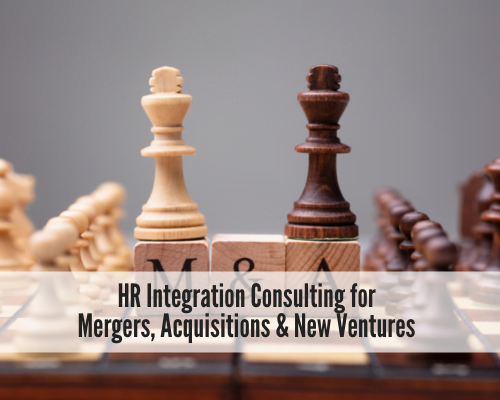This article was written by Mikaela Cohen and was published by HR Brew, which is part of the Morning Brew media group. Our CEO, Karan Ferrell-Rhodes, was interviewed for this piece and frequently quoted.

Thought Leadership Contribution By:
Karan Ferrell-Rhodes
Employee retention. Mullen told HR Brew the next priority for HR leaders is communicating as much information as possible. This can be critical to retention.
“I often see a lot of HR teams, right off the bat, try to do some internal communication around what to expect. What’s the timeline? When will there be answers?” Mullen said. “Often there aren’t answers right away…But [you] have to get ahead of that, because the biggest concern I often see in these types of deal announcements is talent retention.”
Jim Cichanski, CHRO and founder of outsourcing and consulting firm Flex HR, advised anticipating what questions employees will ask and supplying managers with the answers, adding those questions will likely focus on benefits, job security, and compensation.
“All of those things that come across to employees that they worry about, and they go home at night and talk to their spouse about whether they should stay and stick it out or leave and find another company to work for that they’ll know what they’re getting into,” Cichanski said.
He recommended executive leadership be honest, transparent, and expedient when communicating. This, he said, can help alleviate fear and disengagement among employees.
Key talent. Mullen recommended focusing on critical talent needed to carry the company through the M&A.
“Identifying the critical talent is so important for an HR professional upfront, because it’s impossible for you to focus on everyone,” Mullen said. “But let’s say that the sales group is really critical…for the deal to be successful. You need to be doing lots of engagement, lots of listening, lots of cocreation and collaboration with that group.”
Once HR has identified key employees, Mullen said they should tell them that they are especially important for the company’s future and define their role and responsibilities moving forward.
“If you can tell them who their supervisor is going to be, how much is going to change versus not, that helps to calm a lot of the nerves,” she said. “That often requires a bit of planning, so you can’t do that right up close, but as soon as you can, with that critical talent that’s really key.”

It’s essential to carefully consider the full scope of work when faced with a merger or acquisition. And to be honest, I have yet to see an over-staffed HR function which was ready for such change management.
However, the HR workstreams for mergers and acquisitions are part of our specialty. Conducting thorough due diligence and selecting the best consultant with relevant experience, a good track record and a collaborative personality can help mitigate some of any disadvantages you may face.
Also feel free to submit a project inquiry or set up some time with us to discuss further.


